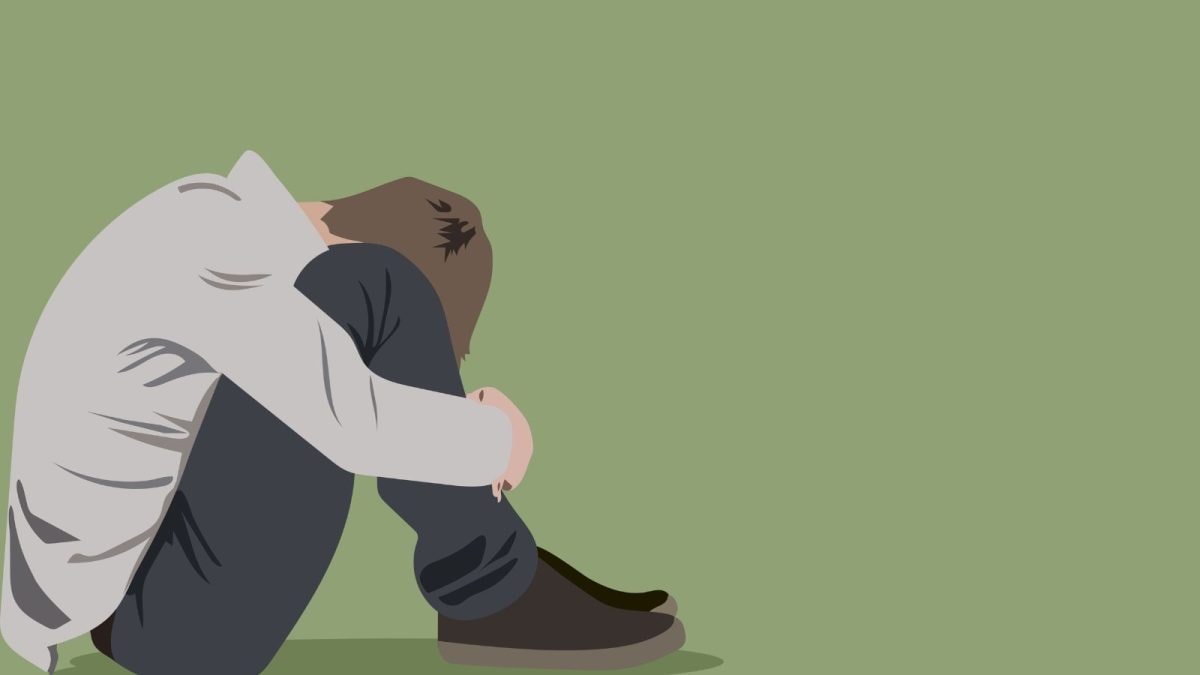Last Updated:
Childhood depression doesn’t always mirror adult symptoms. Instead of a visible sadness, it often shows up as irritability, anger, and low energy.

In children, depression often stems from a mix of emotional and environmental factors. (Image: AI)
It begins quietly. A child who once laughed loudly during playtime now prefers to stay in their room. A once-chatty student suddenly becomes irritable, withdrawn, or easily angered. Many parents brush these changes off as mood swings or the result of “growing up.” But mental health experts say that what looks like normal behaviour could be an early sign of something deeper, childhood depression.
Across India, pediatric clinics and school counsellors are reporting a slow but steady rise in children showing symptoms of depression and anxiety. The World Health Organization estimates that at least one in seven children aged 10 to 19 experiences a mental health condition, with depression and anxiety leading the list. Yet most cases go undiagnosed because parents and teachers fail to recognise the signs early enough.
Recommended Stories
Why children hide their sadness
Children rarely have the language to say, “I’m depressed.” They show it instead. Their pain surfaces in behaviour – anger, clinginess, silence, or physical discomfort.
Experts explain that children process stress through the body before they can articulate it through words. A stomach ache before school, headaches, or sudden loss of appetite may not always be physical; they could be emotional.
Psychologists also note that many children instinctively suppress sadness because they fear worrying their parents or being scolded for “acting out.” When adults dismiss emotions as drama or defiance, it teaches children to mask their feelings rather than share them.
What depression looks like in children
Childhood depression doesn’t always mirror adult symptoms. Instead of a visible sadness, it often shows up as irritability, anger, and low energy. The child may appear defiant, moody, or even aggressive which makes it easy for parents to misread the situation.
Some of the most common signs include:
- Persistent sadness, irritability, or anger lasting more than two weeks
- Loss of interest in play, friends, or favourite activities
- Changes in eating or sleeping patterns – either too much or too little
- Sudden drop in grades or loss of focus at school
- Frequent complaints of headache or stomach ache without a medical cause
- Withdrawal from social interactions or family gatherings
- Low self-esteem, guilt, or talk about being “useless” or “bad”
- Clinginess, fear of being left alone, or refusal to go to school
If more than three of these behaviours persist, mental health experts recommend a gentle check-in rather than waiting it out.
The triggers: what pushes a child into quiet distress
In children, depression often stems from a mix of emotional and environmental factors. Genetics play a role – a child with a family history of depression is more susceptible. But circumstances also matter deeply: loss of a loved one, bullying at school, parental conflict, academic pressure, neglect, or chronic illness can all contribute.
The digital world adds another layer. Excessive screen time, cyberbullying, and social media comparisons feed anxiety and loneliness. Many children experience “digital fatigue” overstimulation without real emotional connection, leaving them restless and drained.
Post-pandemic studies show a worrying link between isolation and early-onset depression. Children who spent formative years learning through screens, with limited peer interaction, are struggling to rebuild social confidence.
The difference between sadness and depression
Every child feels sad or frustrated. But depression is different, it lingers and affects daily functioning. Sadness has a cause and fades with comfort or distraction; depression does not. It blunts curiosity, dulls creativity, and erases excitement even for things the child once loved.
Doctors use a simple guideline: if a child’s mood or behaviour change persists for more than two weeks and interferes with school, friendships, or play, it’s time to seek help.
Why parents often miss the signs
Many Indian parents mistake emotional distress for misbehaviour. Cultural beliefs that “kids have nothing to be depressed about” make the problem worse. Childhood is often viewed as carefree, so parents assume anger or withdrawal is a phase. In joint families, children may be told to “be strong” or “stop crying” rather than being asked what’s wrong.
Another issue is guilt. Parents fear that recognising depression means they’ve failed. But as experts stress, childhood depression is not a reflection of parenting quality, it’s a medical and emotional condition that can be treated effectively.
The science behind the sadness
Biologically, depression affects the brain’s chemical balance, particularly serotonin and dopamine – neurotransmitters that regulate mood, energy, and pleasure. In children, chronic stress or trauma can alter how these chemicals work. Over time, it affects sleep cycles, appetite, and the ability to experience joy.
Brain imaging studies have found that children with depression show heightened activity in regions linked to fear and reduced activity in reward circuits. This means they may feel anxious or guilty without understanding why, and everyday joys feel muted.
When schools become the first line of help
Teachers are often the first to notice when something is wrong. A student who once participated actively may turn quiet, lose focus, or isolate from peers. Progressive schools have begun incorporating wellness counsellors and peer-support groups to detect and address such issues early.
However, many Indian schools, especially outside metros, still lack trained counsellors. Some teachers mistake depressive symptoms for laziness or poor discipline, unintentionally worsening the child’s sense of failure. Collaboration between schools and parents is essential, neither can solve it alone.
What parents can do at home
The first step is awareness. Watch for patterns, not isolated incidents. A few days of grumpiness is normal; persistent withdrawal is not. Experts recommend the following:
- Create a safe space: Encourage your child to talk, without judgment or interruption. Listen more than you advise.
- Validate emotions: Instead of saying, “Don’t cry,” try “I can see this is really upsetting you.”
- Maintain routine: Regular meals, sleep, and playtime stabilize mood.
- Limit screen exposure: Replace scrolling with shared activities — art, games, or outdoor play.
- Watch for school stress: If grades slip suddenly, talk to teachers before scolding the child.
- Seek professional help: If sadness lasts beyond two weeks, consult a child psychologist or paediatrician. Therapy is not punishment; it’s support.
Early therapy works better than later regret
Studies show that early intervention, even short-term counselling can reset emotional patterns in children. Cognitive behavioural therapy (CBT), play therapy, and family counselling are effective in teaching coping mechanisms. In moderate to severe cases, doctors may recommend medication, but only under strict supervision.
Therapy isn’t about changing the child, it’s about giving them language and tools to handle emotions safely. With professional guidance, most children recover fully and regain confidence.
What happens if depression goes untreated
Ignoring early signs can lead to more serious consequences in adolescence – self-harm, anxiety disorders, substance abuse, or suicidal thoughts. The National Crime Records Bureau data shows a rise in suicides among students under 18, often linked to academic pressure and isolation. Early awareness can prevent escalation long before crisis hits.
Building emotional immunity: what every family can try
Just as good nutrition builds physical health, consistent emotional care builds mental resilience. Families can try simple daily rituals:
- Shared meals without screens
- Gratitude journaling or bedtime storytelling
- Outdoor walks or short mindfulness exercises
- Encouraging hobbies beyond academics
- Setting boundaries around digital use
- Talking openly about emotions, even the uncomfortable ones
Children who feel heard grow into adults who can ask for help without shame.
The road ahead for India’s families
India’s biggest challenge isn’t just lack of mental health professionals; it’s stigma. Depression is still whispered about, especially in children. Parents fear labels, schools fear blame, and communities prefer silence. But silence is the costliest mistake of all. Awareness and empathy can turn the tide.
More states are now introducing mental health programmes in schools, while NGOs and start-ups are building helplines and child-friendly therapy apps. But systemic change begins at home, with parents recognising that a child’s mental health is as vital as their grades or diet.
The takeaway: early empathy saves lives
When joy quietly slips away, children rarely shout for help. They whisper through behaviour, through silence, through small changes that busy adults overlook. Recognising those whispers early can make the difference between struggle and recovery.
Depression in children is real, treatable, and preventable with care. What they need most is not perfection from parents, but presence – someone who listens, without rushing to fix. Because for many children, healing begins the moment they feel seen.
October 07, 2025, 16:39 IST
Loading comments…
Stay Ahead, Read Faster
Scan the QR code to download the News18 app and enjoy a seamless news experience anytime, anywhere.

login
Go to Source
Author: News18



